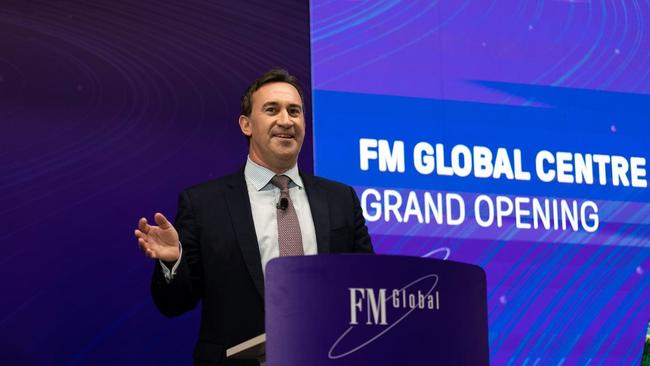Companies need to insulate themselves from climate risk, says FM Global’s chief
Australian companies must reduce their exposure to rising climate change events such as bushfires, cyclones and floods, says FM Global chief Malcolm Roberts.

Australian companies needed to be proactive in reducing their exposure to rising climate change events such as bushfires, cyclones and floods, with reinsurance premiums for the region set to rise, the chief executive of US property insurance giant FM Global Malcolm Roberts has warned.
In an interview with the Australian during a visit to Melbourne to mark the company’s 50 years of operation in the country, he said the reinsurance market looked like becoming one of the toughest in 20 years as the major players grappled with increasing incidences of events, such as the floods in Australia and other major weather events in the Asian region.
He said rising inflation and supply chain disruptions post Covid-19 were also making it harder and more expensive for companies to recover from major disasters to their operations, multiplying the cost of recovery by several times.
But companies that were not proactive in preparing for major disasters could see their insurance premiums rise and, in some cases, not being able to get affordable cover at all, as reinsurance companies began to discriminate between customers.
“The reinsurance industry has had a very tough time over the last three or four years and they are about to put a lot of pressure on rates,” he said.
“Property insurance against catastrophic events such as floods, cyclones and earthquakes-is very expensive anyway, and people in the insurance market are losing money in that space.”
“In these kinds of markets, there is always a flight to quality. We can see it in Australia where our local business has grown significantly over the past four or five years.”
Based in Rhode Island, FM Global is one of the world’s largest commercial and industrial property insurers with global revenues of more than $US9bn ($13.3bn), insuring a third of the Fortune 500 companies.
The company, which insures 20 per cent of Australia’s top 200 companies, including 70 large-risk clients, has seen its Australian business grow from writing premiums of $20m a year in 2001 to more than $350m a year today.
Mr Roberts said the insurance market for major catastrophises was “one of the hardest markets we have seen in 20 to 30 years”. “From a client perspective, it is not a good situation.”
Mr Roberts was speaking after opening a new $100m risk-management facility in Singapore, which will become a centre for researching the impact of climate change and major natural disasters in the region.
The centre will look at ways to help companies improve their resilience against climate change events and natural disasters.
“We are seeing temperatures rising and climate change risks becoming more frequent and more severe,” he said.
He said there had been a change in thinking by major global companies about the need to be prepared for climate change events and major natural disasters. “Over the last five to 10 years there has been way more interest. There is now a realisation that it is not about if these events are going to happen, but when they are going to happen.”
He said there had been a lot more interest in flood mitigation strategies by companies in Australia in the wake of the severe flooding this year.
He said FM Global was also working with standards authorities in Australia in developing building codes that reflected the latest in its research in terms of responding to natural disasters, including floods and fires.
He said his company was also looking at ways to extend its coverage of the growing renewable energy sector itself. The rise in the use of batteries for storage of solar energy was creating a new risk problem with the incidences of fires in battery farms.
“There are just as many risks with renewable energy as with fossil fuels,” he said.
Glenda Korporaal travelled to Singapore as a guest of FM Global




To join the conversation, please log in. Don't have an account? Register
Join the conversation, you are commenting as Logout